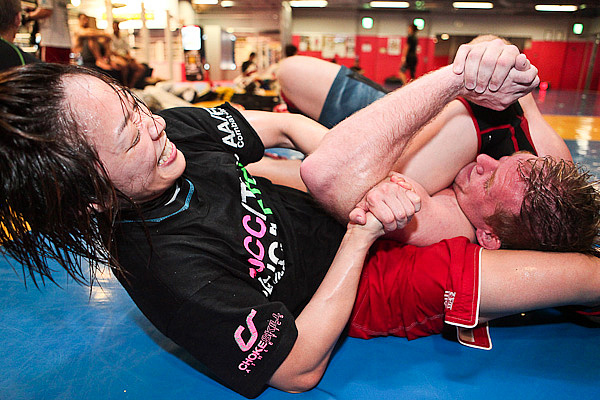Fujii Defying History, Convention One Fight at a Time
Exception to the Rule
Tony Loiseleur Sep 30, 2010

Megumi Fujii rolls with Josh Barnett: Sherdog.com
Furthermore, most of the women who blazed a trail for MMA in Japan, such as Megumi Yabushita, Yoko Takahashi and even the famous “Lioness Asuka” Tomoko Kitamura, are pro wrestlers. Further speaking to this deep-rooted wrestling traditionalism, the first promotion in Japan to even occasionally promote women’s MMA was Ladies Legend Pro Wrestling. Yabushita and Takahashi -- in addition to Fujii -- remain the most important and influential pioneers and role models for female fighters in Japan. Although Fujii is the odd one out in that trio, as she was not trained as a pro wrestler, the fact she herself dabbled in pro wrestling before she debuted in MMA is telling.
Advertisement
Japanese promoters cannot provide both a lucrative and athletically satisfying industry for female fighters in Japan. In terms of developing committed fighters with the skills necessary to make their mark on the international scene, women’s MMA in Japan loses out and thus maintains its underground profile. Japanese female fighters therefore rarely train full-time -- in some cases, they do not have the facilities or support to do so -- nor do they have an impetus to train for full-rules MMA bouts. Naturally, the lack of money and resources mean that even if fighters gain the opportunity to fight abroad, they still lack the proper foundation to have a successful international career.
Exception to the Rule
Fujii is the exception. She is one of the few women in Japanese MMA that has leveraged her successes against promoters in an attempt to conduct her career in a manner that largely reflects men’s MMA careers. She is personally fueled by the notion that MMA is a global sport, actively seeks to face her best contemporaries and feels she deserves to be paid for it.
Since her MMA debut in 2004, Fujii has steadfastly campaigned for women to fight under full MMA rules, so much so that she has occasionally brought about the ire of promoters for whom she fought. In her July 2009 bout against Saori Ishioka, Jewels’ staff had to keep the fact that the fight would be contested under full MMA rules a secret from event advisor and Deep promoter Shigeru Saeki, a staunch opponent of ground-and-pound in women’s MMA.
“MMA is only MMA because everything is possible,” Fujii says. “When promoters say, ‘I don’t want to see girls get hit’ or ‘if people see women getting hit, they won’t want to come out,’ I want to ask them, ‘Well, what are you expecting? What do you think we’re doing here? What are you hoping to show if it’s women’s MMA?’”
Fujii claimed that even in its beginning, critics of MMA were horrified that men were allowed to hit each other on the ground. Time passed and feelings changed, however. She reasons that if feelings could change for men, why not for women, as well?
“If men weren’t allowed to do full MMA rules, too, then there would be a big difference in skill [compared to fighters abroad], wouldn’t there?” she asks. “We don’t want that difference to be there when we go out and fight abroad.”
Between fighting for ground-and-pound and demanding purse parity with males, Fujii has actually become a thorn in the side of Japanese promoters because of her demands in an environment that has little room for their accommodation. However, her ongoing successes in Japan and abroad, in particular, have made her voice an irresistible one.
Fujii nets purses between $1,000 and $2,000 per fight in Japan, while most women earn in the hundreds of dollars. In Bodog Fight, where she defeated Lisa Ward -- her opponent in the Bellator Fighting Championships 115-pound tournament semi-finals at Bellator 31 on Thursday in Lake Charles, La. -- she made more than $10,000.
“For women to keep fighting in MMA,” Fujii, says, “it’s important that they receive enough money to survive and make it worthwhile to pursue fighting as a career.”
Irresistible Voice
As both the highest paid -- which is a pittance when collectively compared to the purses Carano and Cyborg have earned -- and most achieved Japanese female fighter, Fujii has become a role model and a symbol for women looking to make a career of fighting in Japan. Her recent place in the Bellator women’s 115-pound tournament only further accentuates her importance.
“By fighting in Bellator and being successful, I think it’s quite possible that promoters and female fighters in Japan will change their thoughts on women’s MMA,” says Fujii, who claims she has received more attention than normal since entering Bellator. “It will show them that there is something bigger, beyond just MMA in Japan.”
Her Bellator run will largely determine her legacy. It is her first real introduction to a Western audience, which has been lectured about her greatness but has yet to see it firsthand. However, more importantly, it is also shaping up to be a testament of the possibilities open to female fighters in Japan.
“The U.S. is the leading nation for MMA, and by fighting there, it would show female fighters that maybe they can do the same thing too, especially for those who have the passion and motivation to become a full-time professional fighter,” Fujii says. “It would give them hope. The same goes for promoters, I think.”
She may not get rich in Bellator, but Fujii is blazing a trail. Success in Bellator will further prove to Japanese promoters and fighters alike that women can indeed have a fruitful career in MMA, and that there is a life trajectory beyond domesticity, a world where women can dare to be winners without the fear of being “loser dogs.”
Related Articles







